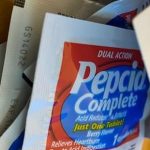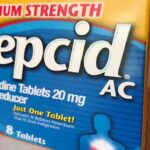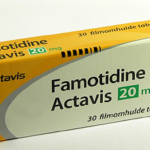How Long After Taking Pepcid Can I Eat or Drink?

For most people, taking a new medication may mean switching up your lifestyle a bit and that includes the foods you eat. A food-drug interaction means that a specific nutrient or compound within the food changes the way your body metabolizes the medication, and this can either enhance or reduce the dose your body gets, according to Johns Hopkins Medicine.
Before introducing a medication, ask your pharmacist about any food interactions, including with alcohol, and any adjustments you may have to make to your diet. In this article, we will discuss Pepcid and how long you should wait before eating after taking the medication.
What is Pepcid?
Pepcid is a brand of famotidine, a medication used to treat ulcers of the stomach and intestines and to prevent intestinal ulcers from coming back after they have healed. This medication is also used to treat certain stomach and throat (esophagus) problems (such as erosive esophagitis, gastroesophageal reflux disease-GERD, Zollinger-Ellison syndrome).
Famotidine belongs to a class of drugs known as H2 blockers. This medication is also available without a prescription. It is used to prevent and treat heartburn and other symptoms caused by too much acid in the stomach (acid indigestion). If you are taking this medication for self-treatment, it is important to read the manufacturer’s package instructions carefully so you know when to consult your doctor or pharmacist.
How Pepcid works
Pepcid belongs to a class of drugs called histamine-2 receptor blockers. A class of drugs is a group of medications that work in a similar way. These drugs are often used to treat similar conditions.
Famotidine works by blocking the histamine 2 (H2) receptor in your stomach. This receptor helps release acid in your stomach. By blocking this receptor, this drug lowers the amount of acid released in your stomach. It relieves symptoms such as a cough that doesn’t go away, stomach pain, heartburn, and difficulty swallowing.
How is Pepcid taken?
The recommended dosage for Pepcid AC (famotidine) is as follows:
• Gastric ulcer: Take 40 mg by mouth once a day.
• Duodenal ulcer: For treatment of an active ulcer, take 40 mg by mouth once a day or 20 mg by mouth twice a day. To prevent ulcers from recurring, take 20 mg by mouth once a day.
• GERD: Take 20 mg by mouth twice a day.
• Erosive esophagitis: Take 20 mg or 40 mg by mouth twice a day.
• Other rare conditions that cause excessive stomach acid secretion (i.e., Zollinger-Ellison syndrome): Start with 20 mg by mouth every 6 hours. Adjust the dose to your specific needs and symptoms. The maximum dose is 160 mg by mouth every 6 hours.
• Heartburn (over-the-counter formula): To relieve symptoms, take 10 mg or 20 mg by mouth once a day. Do not take more than 2 tablets per day for either strength (10 mg or 20 mg).
If you stop taking the drug suddenly or don’t take it at all: Your acid reflux, heartburn, or ulcer symptoms may not get better or may get worse.
If you miss doses or don’t take the drug on schedule: Your medication may not work as well or may stop working completely. For this drug to work well, a certain amount needs to be in your body at all times.
If you take too much: You could have dangerous levels of the drug in your body. Symptoms of an overdose of this drug can include:
- agitation
- confusion
- seizures
- severe muscle pain
If you think you’ve taken too much of this drug, call your doctor or local poison control center. If your symptoms are severe, call 911 or go to the nearest emergency room right away.
What to do if you miss a dose: Take your dose as soon as you remember. But if you remember just a few hours before your next scheduled dose, take only one dose. Never try to catch up by taking two doses at once. This could result in dangerous side effects.
How to tell if the drug is working: You should have less pain and your symptoms should improve.
How long after taking Pepcid can I eat?
To prevent symptoms, take Pepcid 15 to 60 minutes before eating foods or drinking drinks that may cause heartburn. Avoid foods that make your symptoms worse. Foods and drinks that have been suspected of this include peppermint, tomatoes, chocolate, spicy foods, hot drinks, coffee, and alcoholic drinks. If it seems that a food is aggravating your symptoms, try avoiding it for a while to see if your symptoms improve. Also, try avoiding eating large meals, as these can make your symptoms worse too.
If you are overweight, this puts extra pressure on your stomach and encourages the symptoms of acid reflux. Losing some weight and eating a healthy balanced diet may help you.
Smoking also increases the amount of acid produced by the stomach and may make your symptoms worse. If you are a smoker, speak with your doctor or pharmacist about how to quit.
Follow the directions on your prescription or the package label carefully, and ask your doctor or pharmacist to explain any part you do not understand. If symptoms of heartburn, acid indigestion, or sour stomach last longer than 2 weeks, stop taking over-the-counter famotidine and call your doctor.





